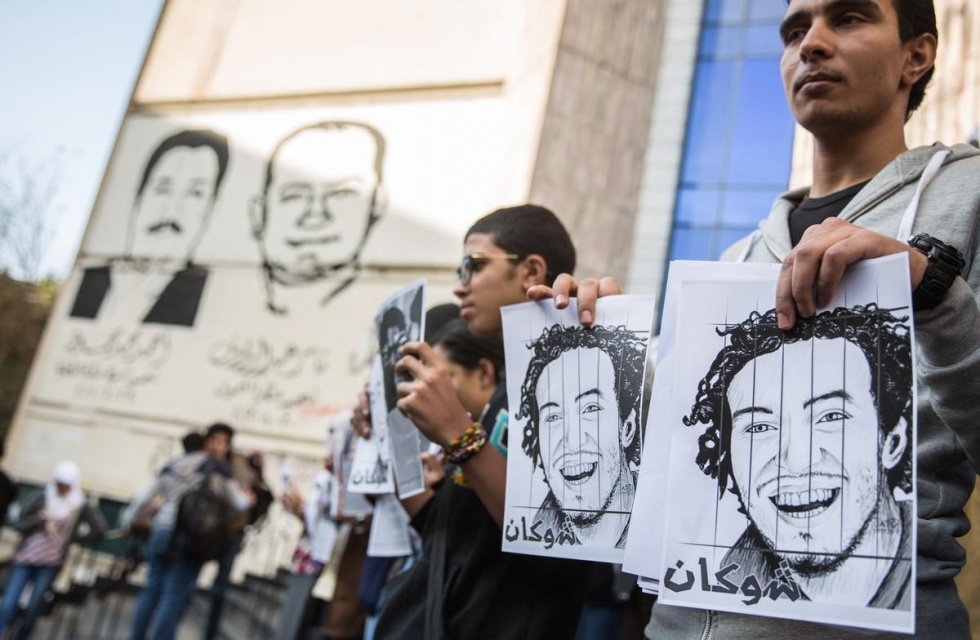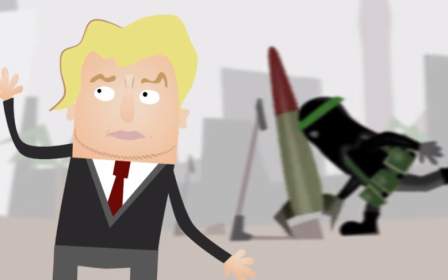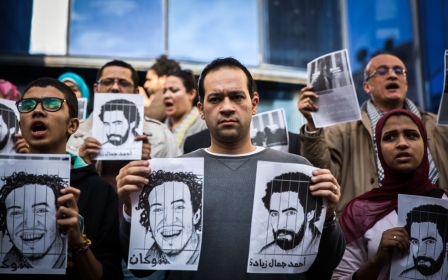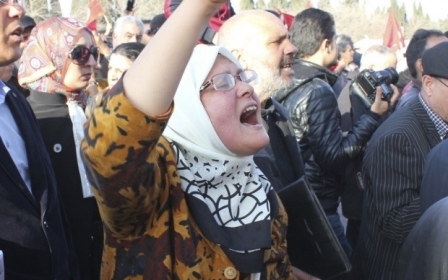Detained journalists in Egypt at all-time high: CPJ

CAIRO – Egyptian authorities are holding 18 journalists behind bars, the highest number in the Arab country since record keeping began in 1990, the Committee to Protect Journalists (CPJ) said in a report released on Thursday.
“The threat of imprisonment in Egypt is part of an atmosphere in which authorities pressure media outlets to censor critical voices and issue gag orders on sensitive topics,” CPJ said.
According to the census, six journalists were sentenced to life in prison, while several others are being held in pre-trial detention.
CPJ said most of journalists behind bars are accused of belonging to the now-banned Muslim Brotherhood, the group from which deposed president Mohamed Morsi hails, and which the government designated as a “terrorist” group in late 2013.
“Entire outlets, such as Al Jazeera and the Turkish Anadolu news agency, have been banned from operating or forced to close their offices,” the report said.
Last month, Anadolu Agency downsized its Cairo office, citing limitations of its journalists to do their work and failure of Egyptian authorities to renew the agency’s accreditation.
“However, our expectation from Egyptian authorities for accreditation continues and in the meantime, our office in Cairo will continue its operations,” Anadolu Agency said in a statement earlier this month.
Last year, Al Jazeera closed its affiliate Al Jazeera Mubasher Misr, which had been devoted exclusively to covering events in Egypt.
Egypt has been in the throes of political violence since the military unseated Morsi, the country’s first freely elected president, in a 2013 coup, following protests against his administration.
Press freedom
CPJ said that journalists are often beaten and abused during their detention.
“The arrests of journalists in Egypt are often violent and involve beatings, abuse, and raids of their homes and confiscation of their property. Their prison cells are often unclean and overcrowded,” the report said. “In letters from prison, some journalists wrote that they often do not see sunlight for weeks; others described the torture of prisoners, including the use of electric shocks.”
The CPJ report said detained journalists have often gone missing for periods of time and their whereabouts are unknown to lawyers or family members.
“Their court hearings sometimes take place without notice to the journalist or lawyers. Other times, prison authorities refuse to allow the journalist to attend the court hearing or sentencing.”
The group went on to say that Egyptian authorities were using the pretext of national security to crack down on human rights, including press freedoms.
Attempts by Anadolu Agency to reach the Egyptian Interior Ministry spokesman for comment have failed.
Prison wish
The CPJ said the heavy restrictions on journalists have left entire regions under-covered, such as the Sinai Peninsula, where the army has been cracking down on militancy.
It said journalists attempting to cover news in the peninsula have been denied entry at military checkpoints, while others who live there face threats from both the authorities and militant groups.
“Journalism is over in the Sinai,” one veteran reporter who has worked extensively in northern Sinai told CPJ, requesting anonymity. “The only reporting we can do is [to] tell the army’s story. Anything else is a prison wish.”
Middle East Eye propose une couverture et une analyse indépendantes et incomparables du Moyen-Orient, de l’Afrique du Nord et d’autres régions du monde. Pour en savoir plus sur la reprise de ce contenu et les frais qui s’appliquent, veuillez remplir ce formulaire [en anglais]. Pour en savoir plus sur MEE, cliquez ici [en anglais].




